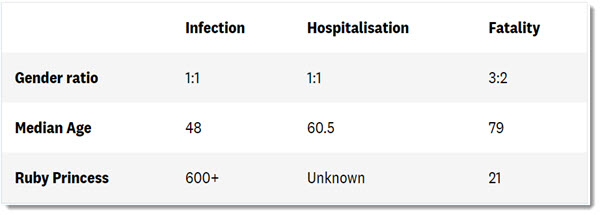
There have been 88 COVID-19 deaths in Australia: Impressive in international comparisons, but still a terrible toll.
Coronavirus fatality and severity is not only linked to age but underlying health conditions. Australia is not a healthy country: Around half of all Australians suffer from a chronic disease, while two-thirds of us are overweight or obese.
COVID-19 isn’t going to be our last pandemic. Poor public health costs the country billions, and that bill rises during a pandemic. Crikey takes a look at those whose health is most affected by COVID-19, and asks whether this will be our public health wakeup call.
A breakdown of infections and fatalities

Gender: While there are more or less equal rates of infection and hospitalisation among men and women, men make up more fatalities. Of the 88 people who died in Australia, 49 were men and 32 were women (seven genders were unknown). According to the latest epidemiological report, men make up 60% of fatalities, at a rate of 3:2.
Age: The median age of all COVID-19 cases was 48, with children under 10 making up less than 1% of cases.
Cruise ships: Cruise ship infections accounted for 42% of all cases in the 70-79 year age group. The Ruby Princess cruise ship has been linked to more than 600 infections and 21 deaths.
Nursing homes: 11 deaths were linked to Newmarch House nursing home, with a further six at Dorothy Henderson Lodge aged care facility, both in NSW.
Aboriginal and Torres Strait Islander persons: This group represents less than 1% of all Australian cases, with 10% of cases admitted to hospital. There have been no reported death or ICU admissions.
Why comorbidities are a concern
Underlying health conditions play a massive role in coronavirus severity and susceptibility — while those with cardiac disease made up 9% of coronavirus cases, they made up 22% of ICU admissions. More than a quarter of hospitalised coronavirus patients were obese, while 30% were diabetic.

One of the major underlying conditions in severe COVID-29 cases is obesity, which is linked to three critical illnesses: Low lung capacity, diabetes, and high blood pressure, Professor Nikolai Petrovsky at Flinders University’s College of Medicine and Public Health told Crikey.
“With any respiratory infection, obese people are at higher risk of needing ventilation,” he said. “We saw this during swine flu.”
Large amounts of abdominal fat push up the diaphragm, squishing the lungs. “In obese people, their lung capacity is smaller — sometimes half,” Petrovsky said. This also results in more severe cases of pneumonia, common in COVID-19 patients.
The second illness is diabetes. Type 2 diabetes is strongly correlated with obesity. “High sugar levels suppress the immune system, which is why diabetics sometimes get foot infections and gangrene,” Petrovsky said. Diabetic patients are at greater risk of not only developing a severe case of COVID-19 but also developing a secondary infection.
Third, and unique to COVID-19, is blood pressure. Half of the patients who died in Wuhan had a history of high blood pressure.
“We haven’t seen this with previous infections — it was a surprising factor,” Petrovsky said. The theory is the coronavirus enters via the ACE-2 protein receptor. Hypertension medication encourages the growth of this receptor.
Will this be a wakeup call?
Unfortunately, Petrovsky said, most of this isn’t new information. “We spend tens of billions every year to manage complications from obesity … it’s not that we’ve not been paying attention,” he said.
Unfortunately, bad habits are hard to stop: “Obesity is like smoking, once people start [the habit], it’s hard to get them to stop,” Petrovsky said.
The solution is to educate children on healthy habits. “We have to start in infancy, teach children how to eat healthily, maintain good body weight, and exercise.”
To get kids exercising, Petrovsky said we need to throw away gaming consoles. “Or, at least educate them to use these devices in a more controlled fashion,” he said.
Sharon Friel, a professor of health equity at Australian National University’s Menzies Centre for Health Governance, told Crikey a more holistic approach was needed.
“What COVID-19 shines a light on is the fragility of our health system and the disconnect within it,” she said. “There are common drivers of health and disease — obesity and diabetes are strongly connected but often treated quite separately.”
She said a people-focused approach in the health system would better treat the causes behind illnesses.
As health habits are formed outside of the health system, solutions need to go beyond healthcare. “Money, a quality job, security and long-term, equitable education — all of this matters for physical and mental health,” Friel said.
She pointed to public policy actions, including JobSeeker payments and rental support as positive steps to improve public health.
“We shouldn’t snap back to the way it was. Keeping these protections in place in health, education and housing, will reduce economic and health costs in the long run,” Friel said.








Thanx for this.
Over 80% of covid19 deaths have been linked to an institution such as a nursing home, retirement village, prison, adult living or rehab centre. I am surprised nursing homes don’t seem to be a centre for covid19 deaths in Australia.
Sorry, I mean that over 80% of covid19 deaths in Canada have been linked to an institution such as a nursing home, retirement village, prison, adult living or rehab centre.
The 3 main complicating/co-morbidity factors are generally regarded as “life style” diseases.
“The solution is to educate children on healthy habits. “We have to start in infancy, teach children how to eat healthily, maintain good body weight, and exercise.””
Seriously? I know what I’m supposed to do to lose weight and maintain a healthy weight, but actually doing those things requires a level of discipline that I just don’t have. I’m bombarded with marketing every time I turn on the TV, or go on the internet, or walk into shops. Even to do something healthy like going for a walk opens me up to massive amounts of marketing so that I’ll want to “try this new food” or “indulge myself” and you want me to believe that education trumps CONSTANT EXPOSURE TO UNHEALTHY FOODS??. I call BS. We need to change the system that allows chips and chocolates and ice cream and lollies to be sold at half price. We need to legislate so that they have plain packaging like cigarettes and can’t advertise. Then we might have a hope of reducing the rates of obesity – just like we’ve reduced the rates of smoking. But to suggest that individuals should change their behaviour whilst the system encourages them to eat poorly is just victim blaming. Stop it.
If “…doing those things requires a level of discipline that I just don’t have…” then you are asking for the Law to protect you from yourself?
That is not its function in any free society.
Obesity is not just unhealthy in itself, it encourages other illnesses. Australia is not a healthy country: Around half of all Australians suffer from a chronic disease, while two-thirds of us are overweight or obese.
Yet it is a measure of the political power of Big Obesity (and of Big Business) that the Big Obesity industry is not merely allowed but encouraged to promote ill-health; it is openly called “junk food”. Regulation of the Big Obesity industry (the unhealthy food industry) is exactly as it would like it – nonexistent.
But politicians’ big support for such evils has a large cost. Thus we pay for Laberal government refusal to control the determination of Big Obesity to profit from selling illness. As with the costs of motor vehicle death and injury, privatisation of profit, socialisation of cost.
A simple stroke of the pen solution to two, fairly major, problems, our fuel (non)reserve & obesity would be to mandate that our vast sugar cane crop be turned into alcohol rather than imbibe the filthy stuff.
We could end another deleterious export industry by making it more profitable to turn into fuel.
“Pure, White & Deadly” as Prof. John Yudkin’s 70s book had it, for which he was blackballed by the British establishment and lost his, till then, distinguished career.
The UK does not grow sugar (apart from beet for cattle feed) but it does have a powerful junk food industry.